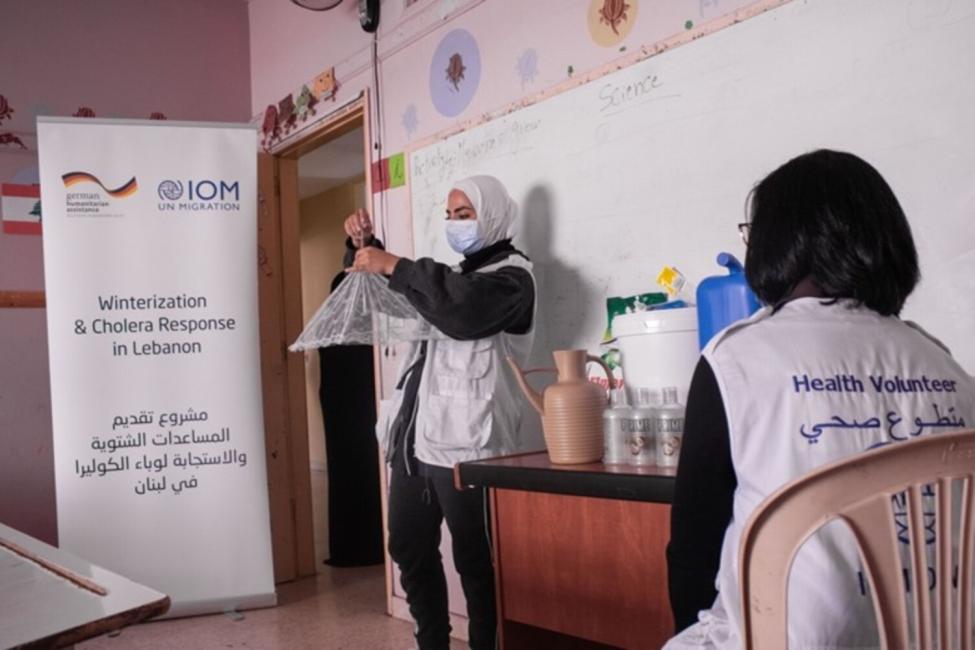-
Who we are
WHO WE AREIOM is the leading inter-governmental organization promoting humane and orderly migration for the benefit of all, with presence in over 100 countries. IOM has been active in the Middle East and North Africa from the early 1980s.
About
About
IOM Global
IOM Global
-
Our Work
Our WorkAs the leading inter-governmental organization promoting since 1951 humane and orderly migration, IOM plays a key role to support the achievement of the 2030 Agenda through different areas of intervention that connect both humanitarian assistance and sustainable development. Across the Middle East and North Africa region, IOM supports States in realizing their national priorities and in fulfilling their international commitments in the areas of migration, displacement and mobility.
Cross-cutting (Global)
Cross-cutting (Global)
- Where we work
- Take Action
- Data and Resources
- 2030 Agenda
Lebanon- Cholera has spread across Lebanon since October 2022, adding another challenge to households already struggling and to the country’s public health system.
“We used to drink tap water," explains Fatima, a resident in Akkar, where Lebanon’s cholera outbreak first emerged. “Now we must buy bottled water and sanitize all vegetables. We just got over the COVID-19 pandemic and now we have to deal with cholera. We don’t want to live in fear anymore.”
Lebanon has been responding to a cholera outbreak since October 2022, and cases have spread across the country. Amid winter conditions and a severe economic crisis with faltering services, the risk of the disease becoming endemic remains very real. As of 15 January 2023 the country had recorded 23 deaths and 6,129 suspected cases, according to figures from the Ministry of Public Health. As the cases continue to rise, the population is trying to adapt to protect themselves from the disease.
“We use vinegar and salt to wash vegetables because we do not have other detergents. My sister got infected with cholera and we are trying not to catch it, so we cannot eat everything like we used to or live the same way as before,” said Hanaa, at an IOM distribution in November 2022, in Akkar.
To help vulnerable households cope amid winter conditions and the cholera outbreak, IOM has distributed winter cash assistance and hygiene kits to over 1,400 economically vulnerable Lebanese and Syrians households in Akkar and the Bekaa Valley.
In coordination with UNHCR, and local NGOs, IOM teams reached out to families living at high altitudes and in informal tented settlements, providing them with cash assistance to cover heating fuel and other winter needs. IOM simultaneously distributed hygiene kits to help households protect themselves from cholera.
“We are doing our best to protect ourselves from cholera, but we cannot buy everything we need and so we rely on NGOs,” explains Mtanos, who received hygiene kits for his family, and expressed frustration at not being able to cover the basic hygiene needs of his family.
“We thank people who are donating, but if we could afford to buy hygiene goods, we would not be here today.”
In parallel to the distribution, IOM health volunteers have been delivering awareness sessions to vulnerable communities, having reached approximately 29,000 people through various channels.
Volunteers are providing key information on cholera, the symptoms, preventive measures, and how to access medical support in case of they get sick.
For Assaad, a father and husband, cholera has already entered the household. “We are a family of seven and half of them got infected with cholera. We boil water, add salt before drinking it and add vinegar for sanitation purposes. We don’t have chlorine, but I am doing everything I can to protect my family.”
IOM Lebanon has been assisting the most vulnerable, thanks to funds from the German Federal Foreign Office. More support is needed to continue our response.


